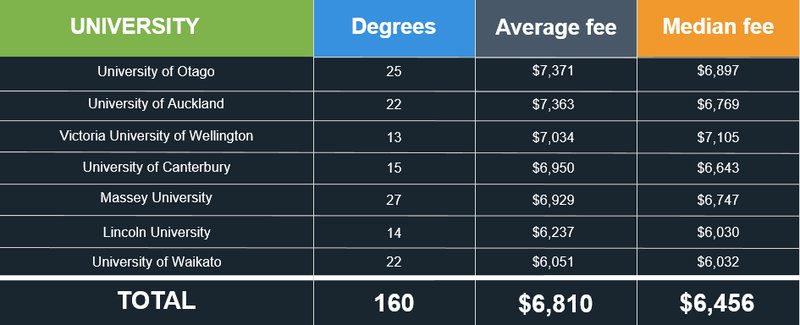Tuition fees
XXXX.
TX
2015 fees by university for fulltime programmes

XXXXXXXXXXXXXXXXXXXXX.
XXXXXXXXXXXXXXXXXXXXXXXXX
XXXXXXXXXXXXXXXXXXXXXXXXXXXXX
For more information about the costs associated with degrees in New Zealand click here.
Setting fixed fees
Lincoln University have just announced that they will be offering a set price for domestic students, and introducing 'package' fees for students who enrol in some full-time degrees.
Tuition fee inflation is a growing issue both in New Zealand and overseas. Lincoln's degrees are already relatively affordable compared to other universities. Median fees at Lincoln are $6,030 which is the lowest in the country, and their average fees (for a full-time programme) are $6,237 (only Waikato's are lower at $6,051).
2015 fees by university for fulltime programmes

Some of this difference is because Lincoln tends not to offer degree programmes in areas that are associated with higher fees (such as engineering or medicine). But even if we compare similar fields of study Lincoln does well. For example, Lincoln is the second cheapest for sports and recreation studies and business and management, and third cheapest for natural sciences.
Prospective students should look closely at the advantages of this offer. Students studying at Lincoln will be better off over the course of their degree compared to studying at the most expensive university in the same field - the median difference in fees over three year is about $2,500. For a three-year degree in Computer Science we estimate the difference will be about $4,260. Once the universities publish their fees for 2016 we will update these results.
It is hard to say what impact this initiative will have on the market for tertiary education. Fees for undergraduate degrees vary widely when you take polytechnics, wananga and PTEs into account. Fees range between $16,000 and $568 per annum. We estimate that Lincoln's fees in those areas where it competes directly with the University of Canterbury are about $2,400 lower (over three years).
For more information about the costs associated with degrees in New Zealand click here.
Pacific Learner Success in Workplace Settings
This project involves a consortium of ITOs and Pacific Perspectives who are exploring the success factors for Pacific learners in workplace settings. The ITOs involved in the project are ServiceIQ, Careerforce, Competenz, and the Skills Organisation. The project is interesting because there is very little research into what works for Pacific trainees who are undertaking vocational education and training.
One of the major outputs of the project has been a thematic literature review. The review is contributing to decision-making by the ITOs about what pilot initiatives they will pursue. The review examines gaps in the existing literature, the role of organisational and employer culture, and suggests opportunities for ITOs to consider in developing initiatives.
You can access the literature review here.
Costs of undergraduate degrees.
A new website, mydegree.co.nz, provides an estimate of the time it can take a graduate to repay the costs of their undergraduate degree.
The website shows that it can take a graduate anywhere between 3 years and 17 years to repay the costs associated with their degree depending on their major.
Mischewski Consulting collated publicly available data about tuition fees, the opportunity costs of studying, course completion rates and the earnings of graduates.
Heart screening pilot programme.
A Ministry of Health fund, the Pacific Grant Fund, provided funding for Capital and Coast DHB to trial a screening programme for rheumatic heart disease in 2012 and 2013.
The programme involved screening year 7 and 8 school children in primary schools with a high Pacific population. The screening programme identified a number of undiagnosed cases of heart disease.
Mischewski Consulting supported the Pacific Grant Fund by providing project management and grant administration services to Pacific Perspectives Limited.
Pacific Health Workforce Service Forecast.
The Pacific Health Workforce Service Forecast provides an overview of the main 'inflows' into the Pacific health workforce, and identified a number of priorities for changes in the way health services are delivered for Pacific peoples. The report is published online and is one of 13 workforce forecasts commissioned by Health Workforce New Zealand.
Mischewski Consulting worked with Pacific Perspectives to describe the role of the education system in developing the Pacific health workforce and developed a model to forecast the size of the workforce through to 2020.
